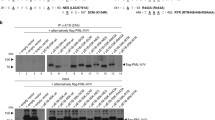Abstract
It has recently been shown that an adenovirus mutant lacking expression of the large E1B protein (ΔE1B) selectively replicates in p53 deficient cells. However, apart from the large E1B protein the adenovirus early region encodes the E1A and E4orf6 proteins which also have been reported to affect p53 expression as well as its functioning. After infection with wild-type adenovirus we observed a dramatic decrease in wild-type p53 expression while no down-regulation of p53 could be detected after infection with the ΔE1B virus. The different effects of the wild-type and ΔE1B adenovirus on p53 expression were not only found in cells expressing wild-type p53 but were also observed when tumor cells expressing highly stabilized mutant p53 were infected with these two viruses. Infection with different adenovirus mutants indicated the importance of a direct interaction between p53 and the large E1B protein for reduced p53 expression after infection. Moreover, coexpression of the E4orf6 protein was found to be required for this phenomenon, while expression of E1A is dispensable. In addition, we provide evidence that p53 is actively degraded in wild-type adenovirus-infected cells but not in ΔE1B-infected cells.
Similar content being viewed by others
Author information
Authors and Affiliations
Rights and permissions
About this article
Cite this article
Steegenga, W., Riteco, N., Jochemsen, A. et al. The large E1B protein together with the E4orf6 protein target p53 for active degradation in adenovirus infected cells. Oncogene 16, 349–357 (1998). https://doi.org/10.1038/sj.onc.1201540
Received:
Revised:
Accepted:
Published:
Issue Date:
DOI: https://doi.org/10.1038/sj.onc.1201540
- Springer Nature Limited
Keywords
This article is cited by
-
The role of cullin 5-containing ubiquitin ligases
Cell Division (2016)
-
Gene therapy for unresectable hepatocellular carcinoma using recombinant human adenovirus type 5
Medical Oncology (2014)
-
Anti-tumor Function of Double-promoter Regulated Adenovirus Carrying SEA Gene, in the Treatment of Bladder Cancer
Cell Biochemistry and Biophysics (2012)
-
Self-association of adenovirus type 5 E1B-55 kDa as well as p53 is essential for their mutual interaction
Oncogene (2010)
-
Oncolytic adenoviral mutants induce a novel mode of programmed cell death in ovarian cancer
Oncogene (2008)




